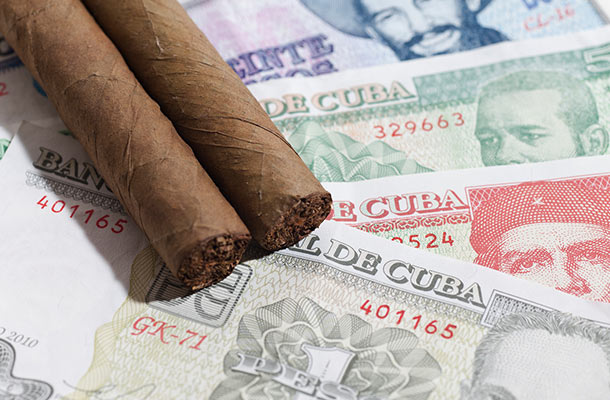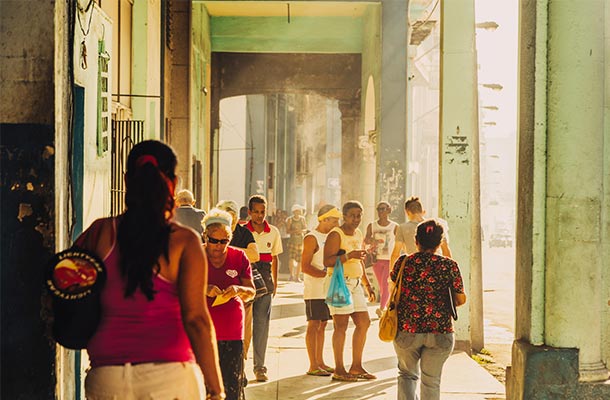Be in the Know: Politics, Money and Staying Connected in Cuba
Be aware of political sensitivities, money and how to stay connected before you travel to Cuba. Here are a few tips for first-time visitors.
 Photo © iStock/PEDRE
Photo © iStock/PEDRE
Cuba is the largest of all the Caribbean islands and offers every bit as much beauty, charm and excitement as its smaller counterparts.
Unlike other islands in the area, however, Cuba is much less commercialized and therefore offers a uniquely authentic cultural experience.
As a result of this, visitors who venture to Cuba should be aware of certain distinguishing details, such as the country's strong political beliefs and monetary regulations to avoid any potential unfavorable incidents while there.
Cuban politics
Cuba happens to be one of the last countries in the world that is still under the stronghold of communism. And while visitors are generally welcomed by friendly citizens, it's important to remember that this one-party state is run quite differently than most.
For instance, it's not uncommon to see police. Political demonstrations are met with strong opposition and can turn very dangerous, very quickly so avoid being near any such event.
One important thing to note is that while some Cubans you encounter may openly discuss, debate and criticize their government, be respectful if you decide to join in. Some people don't take kindly to foreigners disrespecting political icons such as Ernesto "Che" Guevara and Fidel Castro.
The Cuban government is extremely protective of its military and police establishments. As such, it is illegal to take photographs of any such law enforcement. Additionally, taking pictures of travel facilities such as airports, trains, train stations and harbors is also strictly forbidden (as it is in many other countries - never a good idea). This can be tricky since these areas are often not well-marked. Just be extremely cautious when taking photos in Cuba or you may find yourself in serious trouble without even realizing it.
Religion is also a sticky subject in Cuba. If you plan on openly preaching about any type of religious beliefs, do so with caution as they may be considered illegal and have negative consequences. Your best bet is to consult with a local first, just to be sure. Or, better yet, keep your religious opinions to yourself.
Money in Cuba
Spending money in Cuba can be a bit complicated so it's important to understand exactly how things work and what to expect before you arrive.
First, Cuba has what's known as a dual economy. This means they use two different currencies, CUC (convertible Pesos) and CUP (local Pesos, also known as monedal nacional locally - literally national money.). CUC is typically what is used by tourists and can easily be exchanged from other currencies at airports, money exchange offices (called Cadecas) and banks; however, it's important to note that some items in Cuba can only be purchased with CUP.
While Euros, Canadian dollars and Sterling can all be exchanged into Cuban currency without fees, it's important to note that exchanging the US dollar in Cuba will generally incur fees up to 10%, and Australian currency cannot be exchanged there at all.
Additionally, debit cards are not accepted anywhere in the country so plan accordingly. Accessing additional monies while in Cuba can be challenging.
International money transfer agencies, like Western Union, are not available anywhere in Cuba. The alternative is small, local companies but they often charge substantial fees and their business hours can be inconvenient for travelers.
Cuba has very few ATMs, most of which are located in the capital of Havana, so don't count on being able to access cash that way. If you have a MasterCard or Visa, you may be able to obtain a cash advance either at your hotel, or at a local bank or exchange.
If you carry an American Express, you might as well leave it at home. They aren't accepted anywhere in Cuba. There are a few safety issues to consider with regard to carrying and using cash in Cuba, besides the obvious risk of pickpocketing.
First, be careful when hiring a taxi, particularly in Havana, because dishonest drivers are often looking for victims to overcharge. Either consult with a local to figure out what the average fare amount should be, or insist that the driver use the meter.
It can be tricky figuring out exchange rates and how much your Cuban currency is really worth, so be careful not to pay too much.
When you are shopping you should keep in mind that many shop owners are notorious for not giving enough change to tourists. Understanding the difference in value between CUC and CUP can be helpful but confusing, so when in doubt observe what others are paying with and pay close attention to how much you are paying as well as how much change you should be getting back so you don't end up getting ripped off.
Lastly, take care when using a credit card anywhere in Cuba. Pay careful attention when a sales clerk is running it through their machine. Some criminal merchants have been known to swipe unsuspecting tourists credit cards through a nearby bank machine in order to take an unauthorized cash advance.
Be sure to always carefully check your receipts before signing. If the receipt has the word "venta" and a monetary amount, it means a cash advance has been taken. If you don't sign, it can't be processed so be vigilant and you won't end up with any unwelcome surprises.
Staying in touch while in Cuba
In addition to political sensitivity and monetary policies, it's also important that visitors to Cuba understand the limitations of certain communication channels within the country. The government controls internet and email communications so there may be restrictions when attempting to communicate via these channels.
Telephone service is also somewhat unreliable in Cuba, and many mobile phone carriers (even those that offer roaming options) do not function anywhere within the country. You'll want to consider all of these things prior to your trip so you can plan accordingly.
A trip to Cuba can be an absolutely amazing experience, but it's important to note that along with the country's beauty and Caribbean charm there are also unique regulations and standards that visitors should consider before planning their trip. Understanding these important details and putting them into action will help to keep you out of harm's way so you can enjoy a worry-free and memorable trip.
Related articles
Simple and flexible travel insurance
You can buy at home or while traveling, and claim online from anywhere in the world. With 150+ adventure activities covered and 24/7 emergency assistance.
Get a quote
3 Comments
Hello, I am planning to travel to Cuba on an Educational tour. But then, I want to stay on myself for another 6 days. I have a travel license to cover this period. But I am concerned about getting around on my own. I do not want to rent a car, but I do want to explore at least one of the islands, esp Island of Youth. Go snorkling, see the parks, reserves. How to I get around? How much will it cost? WIll it be a problem for me, a middle age woman alone? I will also want to stay at places not in Havana. Finally, how much money should I expect to need for 6 days? I plan to stay in casa regularies as I am on a budget. I would like to stay at a place that charges around $30 a night more or less. I read foreigners cannot take a certain bus system to different cities, how can I get from one place to another? Thank you.
This text is a lie over other. About this politic control, what you tells is something that looks more like the anticuban propaganda than a real analisys of what are you going to find. Im not telling the things there are perfect, but this situation is not real. Is sure that you are going to talk with people about the goods and the problems of the cuban system and no one is going to be arrested for that.
There is also other big mistake you have had about the money. The CUC is the foregin coin and the CUP is the local one.
I have the impression that you have see what you wanted there and you havent been honest with the truth.
Edu,
we have had a review of the copy, and made some minor adjustments which I hope you find more to your liking.... although we never said anyone would be arrested for talking about politics, we suggested it's wise to be sensitive that some people have strong feelings, and not to cause offence. This is a commonly held belief communicated by many organisations and websites from Tripadvisor, to Lonely Planet. Regardless, the text has been changed to better reflect that opinion.
So no, it is NOT anti-Cuban "propaganda", and I'm offended by your assertion that I or World Nomads staff would indulge in such activity.
Phil